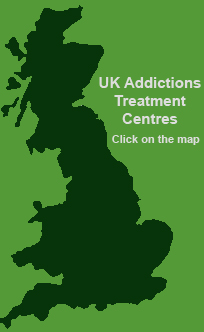How can we help?
Phone 0845 370 0102 for immediate FREE addictions advice for yourself or a friend
Addictions Treatment and Rehab Centres in Devon
AddictionAdvisorTM is a professional addictions healthcare company focused on providing you with high quality expert advice, information, care planning and treatment for addiction problems, wherever you live in the UK.
All advice is provided completely free-of-charge by our expert assessment team. Led by a consultant addiction psychiatrist, the assessment team consists of nurses, doctors, counsellors and psychologists who work together to bring you the best advice, treatment and value available.
Addictions Rehab Centres in Devon
Call 0845 555 444 Now for Full Details
Addictions Advisor's highly trained professionals can give you advice on which addiction treatment center is most appropriate for your need. This is done based on clinical need. Unlike various non-professional rehab ‘referral agents’ operating on the internet, all PCUG Addiction Treatment advice is provided by a highly qualified assessment team which specializes in considering the full range of treatment options available.
The website DryOutNow.com has specific information on alcohol treatment and alcoholism in the south west of England.
Addictions information
Could brain abnormality predict drug addiction
Scientists at The University of Nottingham are to use MRI technology to discover whether abnormalities in the decision-making part of the brain could make some people more likely to become addicted to drugs.
In a three-year study, funded with £360,000 from the Medical Research Council, Dr Lee Hogarth in the University's School of Psychology will study the impact that an abnormal frontal cortex can have in people's risk of becoming dependant upon drugs such as tobacco, alcohol, cannabis or heroin.
Dr Hogarth said: "Evidence suggests that a large percentage of the population try drugs but only a small proportion of experimental users - roughly about 15 per cent - will make the transition to full-blown addiction.
"Our study will move us a step closer to understanding why some people can use drugs recreationally without becoming hooked, while others will go on to develop clinical dependence."
The research will focus on the frontal cortex, the area of the brain which is involved in decision-making and which allows us to weigh up short term gain with potential long term negative consequences. The researchers believe that some people may have a biological predisposition to becoming addicted because this portion of their brain is malfunctioning, preventing them from appreciating risks adequately, leading them to make poor choices in relation to drug abuse.
Young people may be particularly affected by this as the frontal cortex is not yet fully developed, which may explain many risk-taking behaviours in adolescents.
The research will compare students who report social versus daily smoking, and adult smokers who are dependant on nicotine versus those who are not. These four groups will allow researchers to trace the transition to dependence across the lifetime of drug use.
In the experiments, volunteers will first learn to earn cigarettes before this behaviour is punished with an unpleasant noise. The question is whether nicotine dependence is associated with a persistence in cigarette seeking despite the negative consequence of this behaviour, which is the clinical hallmark of addiction.
In addition, researchers will use MRI technology to measure abnormal brain activity in participants who persist in drug seeking, despite this behaviour being punished.
Dr Hogarth commented: "The risk of becoming addicted is due to a failure to offset the anticipated pleasure from drug use with knowledge of the long term negative consequences. The frontal cortex carries signals for anticipated pleasure and pain, so we expect to see an abnormality in the integration of these signals in dependent addicts who persist in punished drug seeking behaviour.
"There is currently a debate as to whether addicts are responsible for their addictive behaviour, which has implications for the funding of their healthcare and treatment. If our hypothesis proves correct, we would argue that addicts are intentionally choosing to take drugs, rather than being controlled, like robots, by urges beyond their control. However, this does not mean that addicts are morally culpable for their choices, because they cannot help being vulnerable to a distortion of the neural system that computes their choices.
"If we identify those who possess this vulnerability, perhaps more can be done to prevent them from making the transition to pathological addiction."
Article originally published on 11/10/2020 by DryOutNow.com, the alcohol specific website for PCUG Addiction Treatment.
DryOutNow.com specialises in alcohol help for those in Devon and Addictions Advisor handles all types of addiction for those in Devon .
Addictions Advice for other areas of the UK
AddictionAdvisor supply professional addictions advice throughout all the UK, including:
Addictions Help London | Addictions Help Glasgow | Addictions Advice Edinburgh | Addictions Advice Manchester | Addictions Help Birmingham | Addictions Advice Cardiff | Addictions Help Liverpool | Addictions Advice Exeter | Addictions Help Plymouth |

Find the lowest treatment costs available in the UK today. Dial 0845 370 0102 .

Find the lowest addictions treatment costs available
in Devon today. Dial 0845 555 444.

Arrange immediate access to residential treatment for drug addiction in Devon. Dial 0845 555 444.
Choose from over 30 UK residential treatment centres to cater for all your individual requirements. Dial 0845 555 444.